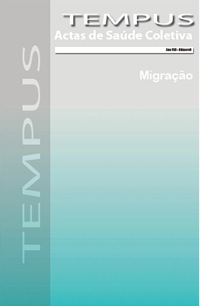Abstract
Demographic changes, unemployment, international crisis, the need to increase household income, among so many particular needs, lead individuals to take risks in search of better living and working conditions in another country. Clandestine migratory movements, sometimes resulting from serious social circumstances, culminate in enhancing the migrant's social vulnerability and, in the case of women, reinforces inequality for gender roles. In this context, jobs focused on informal and precarious work, especially on domestic tasks and homecare, inadequate working hours and conditions, unequal access to material resources and the documentation required to guarantee their rights lead to cruel exploitation of this population. This reality clearly shows the necessity of a study on migrant populations and their professional risks in order to strengthen public policies to support this group, specially immigrant and emigrant women. This article intends to study the health situation of migrant working women by tracing parallels between theory, based on literature review, and the reality of these women, as in the fictitious trajectory of the young migrant Maria in the motion picture “Maria Full of Grace”.
A Tempus garante critérios rigorosos, por meio de avaliação sistemática. Os autores se responsabilizam pela veracidade e ineditismo do trabalho cabendo a eles a cessão de direitos de publicação à revista. A confiabilidade dos conteúdos e a marca própria de apresentação tem como objetivo uma comunicação personalizada, adaptada aos padrões da revista, na medida em que adota critérios de excelência exigidos por seus usuários e especialistas, considerando os rigores da comunicação científica. Os autores devem especificar sua contribuição individual na concepção, delineamento, execução do trabalho, análise ou interpretação dos dados, redação e aprovação final do manuscrito. Incluir Fontes de financiamento e de apoio logístico das pesquisas. Ao final da submissão do artigo, os autores devem enviar uma declaração de cessão de direitos de publicação à Revista TEMPUS , assinada e no formato PDF (Portable Document Format ): Modelo da declaração de cessão de direitos.
